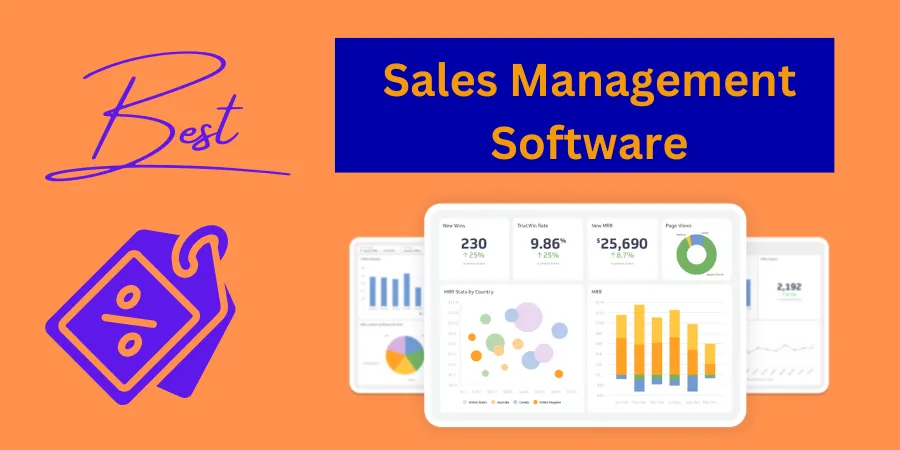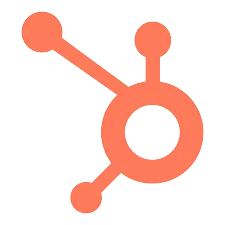11+ Best Sales Management Software [Take Your Sales To The Next Level]
Sales management software is used for tracking and improving sales performance, streamlining sales processes, and organizing a sales team which in turn drives business revenue.
If you are into sales, you probably already know all that.
But really, these tools can help sales teams manage operations and leads, hire and train sales staff, and analyze data.
And can be used by either a one-man-squad, small as well or big sales teams.
So, as always, when there are so many options, it might not really be tough to decide, in this case, which sales management software to get started with.
But people want the best and want to know that they do. That’s why in this guide, we’ll list and review the top sales management software.
What Is The Best Sales Management Software?
Here are my picks for the best sales management software based on fair use, testimonials, popularity, and quality.
1. Salesforce
Salesforce is an industry giant in the world of customer relationship management (CRM) and sales management.
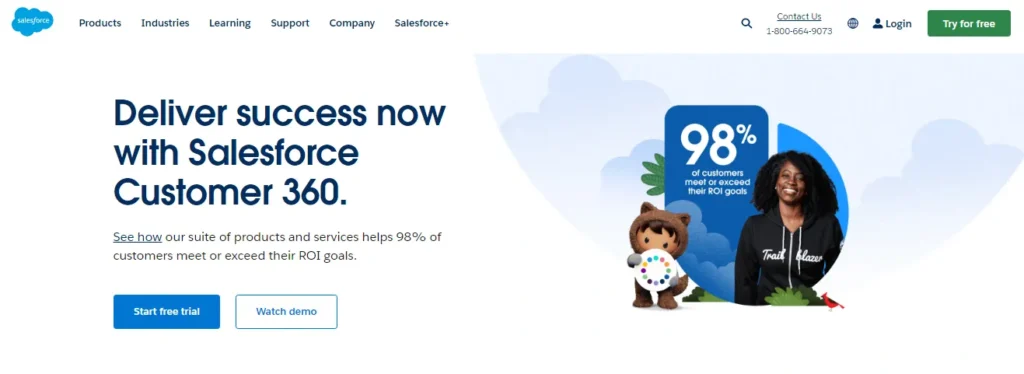
Its robust features cover everything from lead management to analytics, making it a powerful choice for businesses of all sizes.
Pros:
- Extensive customization options for tailored solutions.
- Advanced analytics and reporting capabilities.
- Integrates well with other tools and platforms.
- Scalable for growing businesses.
Cons:
- Steeper learning curve due to its complexity.
- Can be cost-prohibitive for smaller businesses.
- User interface can feel overwhelming for new users.
How to Get Started:
To begin with, Salesforce, sign up for an account on their website. They offer various editions catering to different business needs.
Take advantage of their tutorials and guides to help navigate the platform effectively.
2. HubSpot
HubSpot is a popular sales management software that also includes features for marketing, customer service, and CRM.

With features for lead generation, tracking, and nurturing, as well as built-in communication and collaboration features…
… HubSpot’s sales management software is known for its user-friendly interface and comprehensive suite of tools, making it a favorite among businesses seeking simplicity without compromising functionality.
Pros:
- Intuitive interface, ideal for beginners.
- All-in-one platform with CRM and marketing features.
- Offers a free version with essential features.
- Excellent integration options.
Cons:
- Advanced features may be limited in the free version.
- Customization options can be restrictive for larger businesses.
- Reporting features may not be as robust as some competitors.
How to get started
Visit HubSpot’s website and sign up for a free account. Explore their CRM tools and upgrade to higher tiers for additional features and more extensive customization options.
HubSpot offers a free version of its software as well as paid plans with additional features. You can sign up for a free trial to try out the platform and see if it’s a good fit for your business before committing to a paid plan.
3. Pipedrive
Just as would seem evident from the name, Pipedrive is a sales management software focused on helping sales teams manage their pipelines and close deals more efficiently.
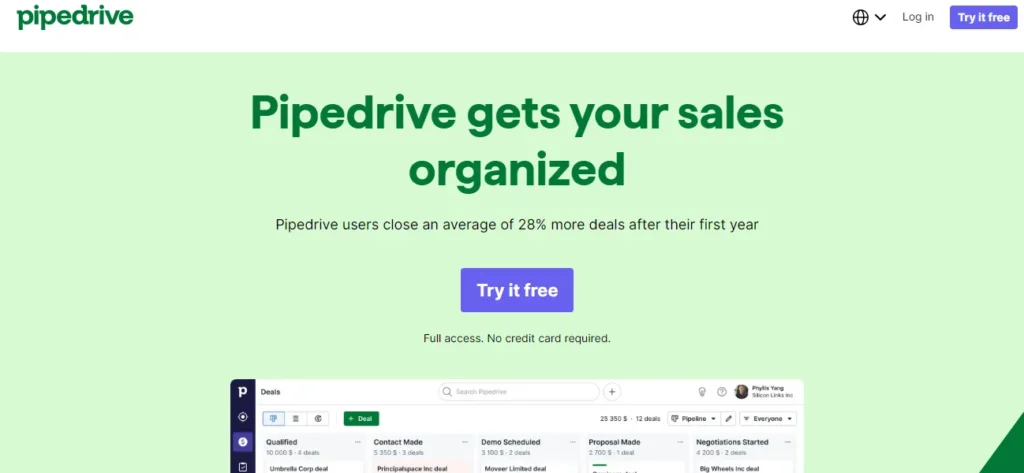
Pipedrive stands out with its focus on visual pipeline management, making it a favorite for businesses that prioritize tracking deals through various stages of the sales process.
Pros:
- Visual pipeline tracking simplifies deal management.
- User-friendly interface with drag-and-drop features.
- Excellent mobile app for sales on the go.
- Integration options with third-party tools.
Cons:
- Some advanced features might be lacking for larger enterprises.
- Reporting capabilities might not be as advanced as competitors.
- Limited marketing automation features.
How to Get Started:
To start using Pipedrive, sign up on their website. Explore the interface and customize your pipeline to match your sales process.
4. Zoho CRM
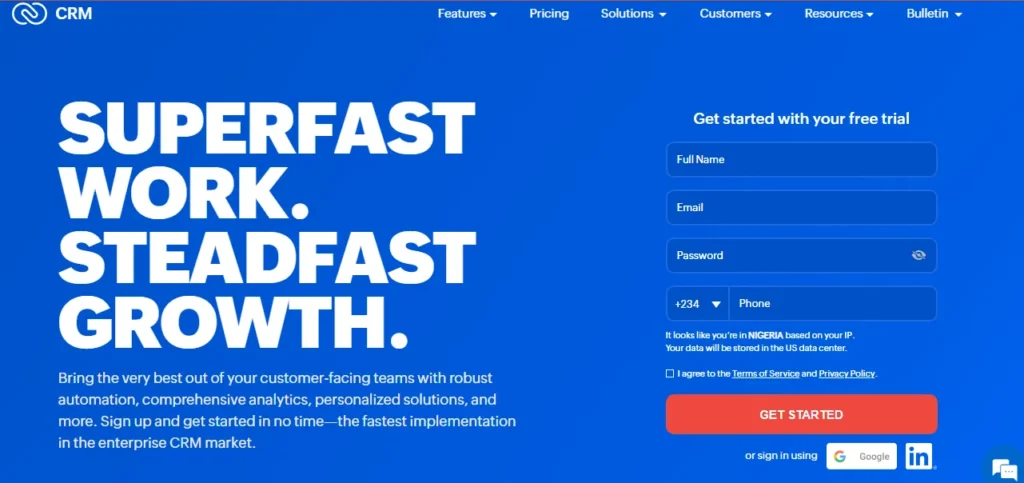
Zoho CRM is a go-to sales and marketing tool you can’t go wrong with, designed to help businesses manage customer relationships and sales processes seamlessly.
Pros:
- Affordable pricing options.
- User-friendly interface with drag-and-drop customization.
- Robust automation features.
- Integration with other Zoho apps and third-party tools.
Cons:
- Some advanced features might require a learning curve.
- User experience can be inconsistent across modules.
- Limited scalability for larger enterprises.
How to Get Started:
Visit Zoho CRM’s website and sign up for an account. Explore their different editions and start customizing the CRM to fit your sales needs.
5. Copper

Copper is a sales management software that will likely suit many Google services users.
Formerly known as ProsperWorks, Copper is known for its seamless integration with Google Workspace, providing a user-friendly experience for Gmail and Google Calendar users.
Pros:
- Tight integration with Google Workspace.
- Simplified contact and lead management.
- Visual pipeline for easy deal tracking.
- User-friendly interface.
Cons:
- Limited marketing automation features.
- Reporting capabilities might be basic for some businesses.
- Customization options might not be as extensive as other options.
How to Get Started:
Sign up on Copper’s website and connect your Google Workspace account. Explore the interface and start managing your contacts and deals.
6. monday.com
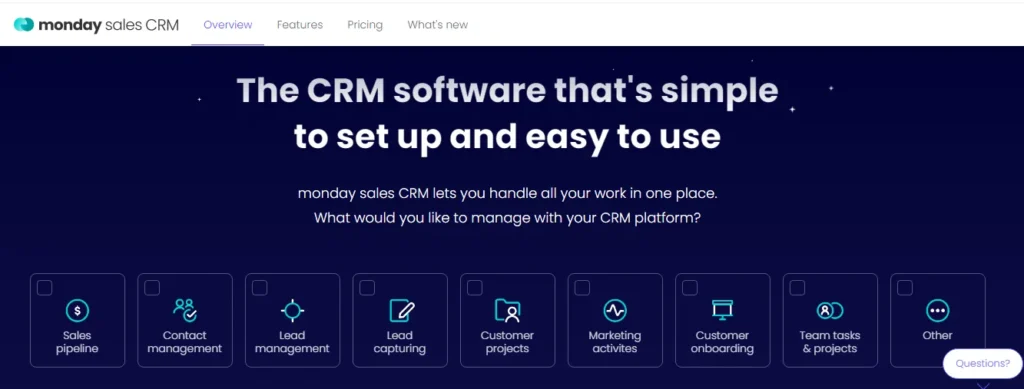
monday.com is a versatile work operating system that can be customized for sales management.
It offers visual project tracking and collaboration features suitable for sales teams of various sizes.
It is a sales management software, yet, works so well for project management, team collaboration, and sales tracking.
It includes tools for lead tracking, task management, and data analysis, as well as customizable dashboards with great integration capabilities.
Pros:
- Highly customizable for various workflows.
- Visual boards and automation streamline processes.
- Collaboration features enhance team communication.
- Integrates with other tools through integrations and automation.
Cons:
- Complexity might be overwhelming for some users.
- Pricing can increase with advanced features.
- Not exclusively focused on sales management.
How to get started
monday.com offers a free trial as well as paid plans with additional features.
You can sign up for a free trial to test out the platform and see if it’s a good fit for your business before committing to a paid plan.
Sign up on monday.com’s website and explore the platform’s customizable features. Build boards that cater to your sales process and team needs.
7. Bitrix24
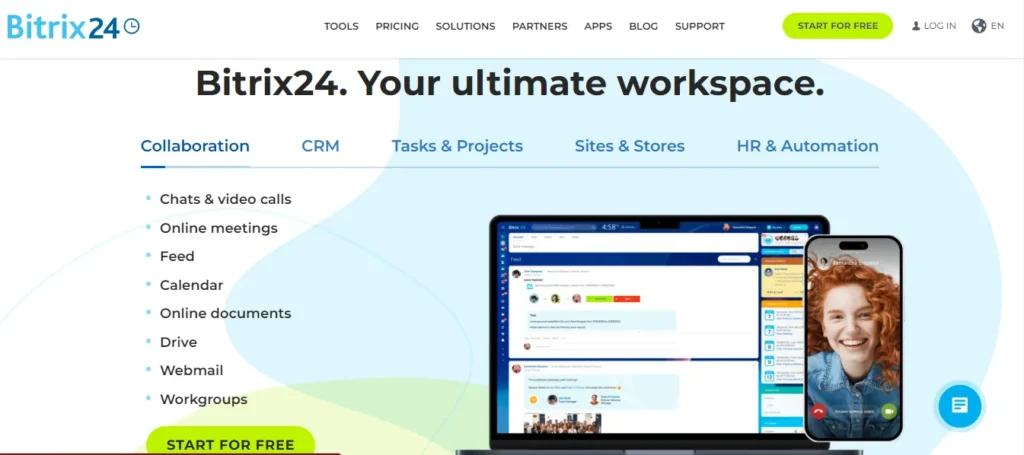
Bitrix24 offers an extensive suite of tools for sales, marketing, and team collaboration.
It combines CRM features with communication tools, making it a comprehensive solution for businesses.
Pros:
- All-in-one platform for sales, marketing, and team collaboration.
- Built-in communication tools enhance collaboration.
- Offers free and affordable plans.
- Automation features streamline processes.
Cons:
- User interface can be overwhelming due to feature richness.
- Advanced features might require time to master.
- Free version has limitations on users and storage.
How to Get Started:
Visit Bitrix24’s website and sign up for an account. Explore the CRM features and start customizing your workspace.
8. Kiite
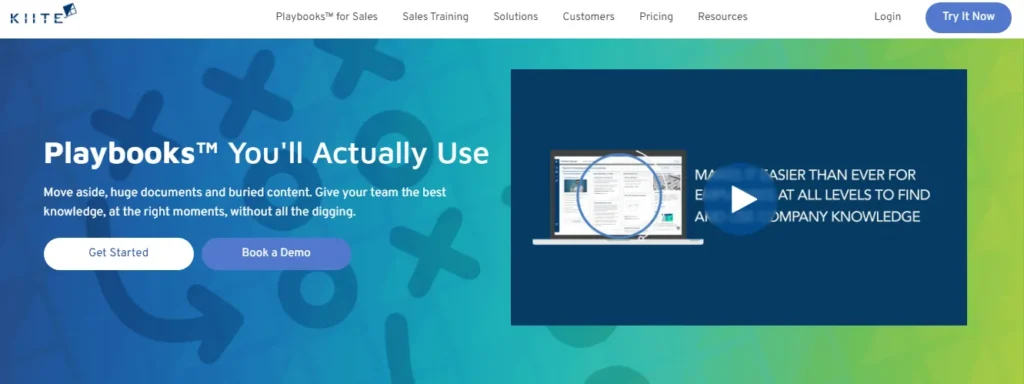
This is a sales management software that uses artificial intelligence to help sales teams manage their pipelines and close deals more efficiently.
Kiite stands out with its focus on AI-driven sales enablement. It offers features that help sales teams access information and insights quickly to close deals more effectively.
Pros:
- AI-driven insights and recommendations.
- Integration with popular communication tools.
- Knowledge management features to enhance sales team efficiency.
- Streamlines sales processes through automation.
Cons:
- Might require time to set up AI and automation features.
- Not as comprehensive in terms of traditional CRM features.
- Limited integration options compared to some competitors.
How to Get Started:
Sign up on Kiite’s website and explore the AI-driven features. Connect communication tools and customize the platform to your team’s needs.
9. Base CRM
Base CRM focuses on helping sales teams build relationships and close deals effectively.
It offers features that cover lead management, communication tracking, and reporting.
Pros:
- User-friendly interface with drag-and-drop features.
- Lead and communication tracking streamline sales processes.
- Integrates with popular tools like Gmail and Outlook.
- Mobile app for on-the-go sales management.
Cons:
- Some advanced features might require higher-tier plans.
- Reporting capabilities might not be as extensive as other options.
- Customization options could be more robust.
How to Get Started:
Visit Base CRM’s website and sign up for an account.
Explore the lead management and communication tracking features to optimize your sales efforts.
10. Taimer
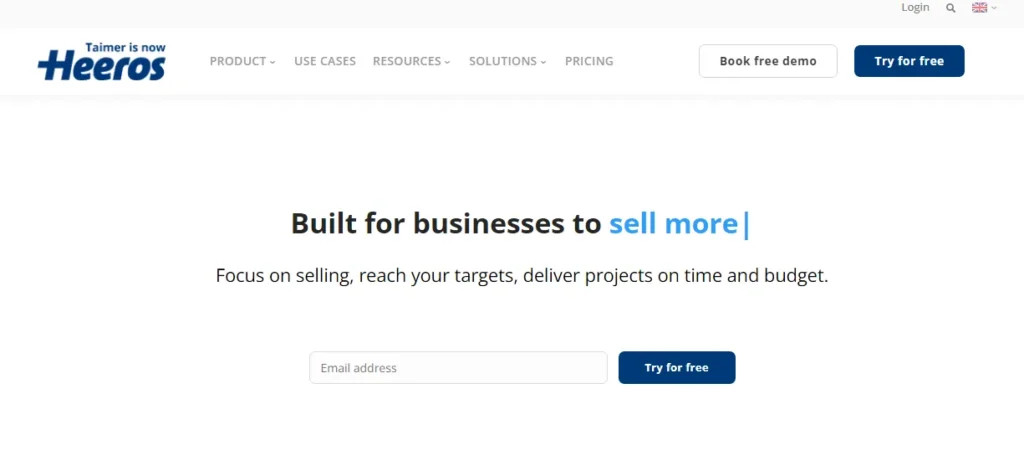
Taimer is a sales management software that offers a range of features for customer relationship management, sales automation, and project management.
is a comprehensive business management platform that includes sales management features. It offers tools for CRM, project management, invoicing, and more.
Pros:
- All-in-one platform for various business needs.
- Integrates sales management with other business processes.
- Automation features streamline tasks.
- Mobile app enhances accessibility.
Cons:
- Complexity due to the range of features.
- Some businesses might not need all-in-one functionality.
- Pricing might be higher for businesses only seeking sales management.
How to Get Started:
Sign up on Taimer’s website and explore the various features it offers. Customize the platform to prioritize sales management for your business.
11. Flowlu
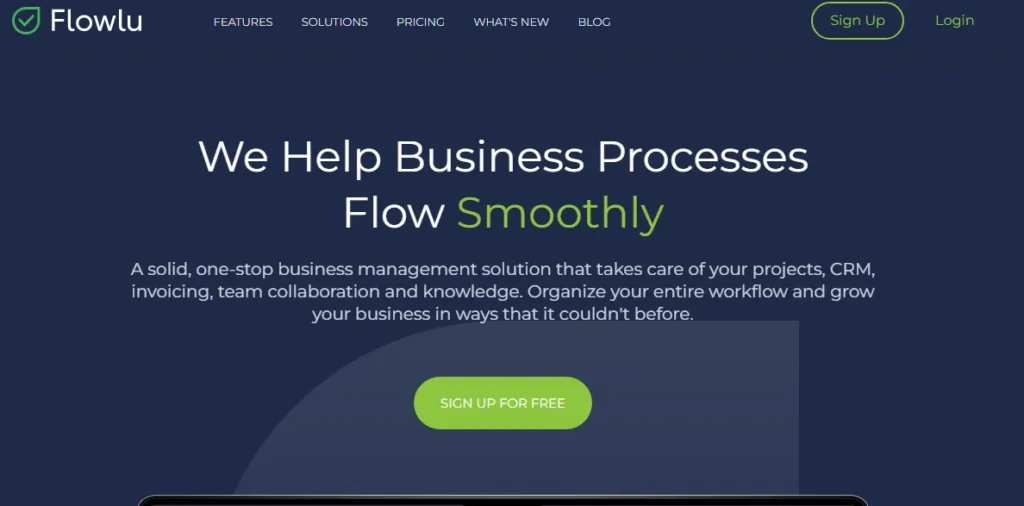
Flowlu provides a suite of business management tools that includes CRM features. It focuses on enhancing collaboration, communication, and project management for sales teams.
Pros:
- Comprehensive suite of business tools.
- Integration of CRM with project management features.
- Visual tools for tracking deals and projects.
- Customization options for workflows.
Cons:
- Complexity due to the range of features.
- Might be more suitable for businesses seeking an all-in-one solution.
- Learning curve for mastering the different modules.
How to Get Started:
Visit Flowlu’s website and sign up for an account. Explore the CRM and project management features to improve your sales processes.
12. Freshworks CRM
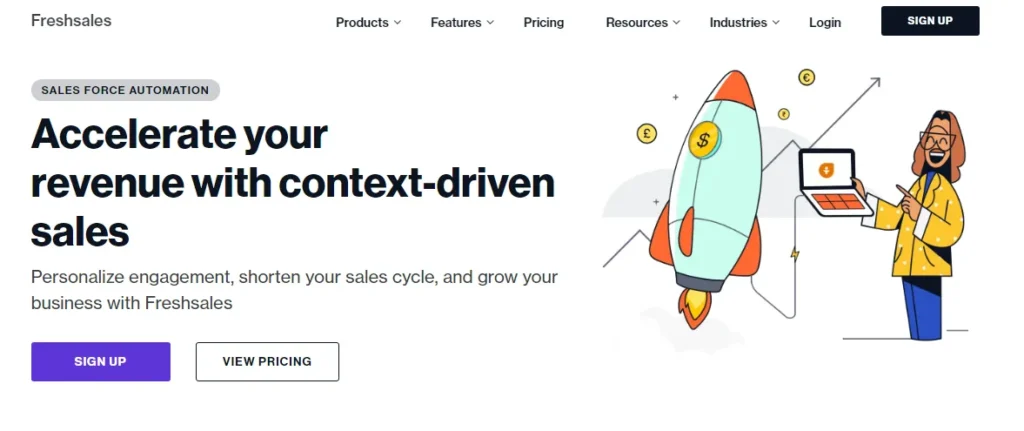
Freshworks CRM offers a range of features to streamline sales and customer relationship management. It focuses on automation, communication, and lead tracking.
Pros:
- Automation features for sales processes.
- Email tracking and engagement insights.
- User-friendly interface with drag-and-drop customization.
- Integration with other Freshworks products.
Cons:
- Some advanced features might be limited in lower-tier plans.
- Reporting capabilities could be more extensive.
- Learning curve for mastering advanced automation.
How to Get Started:
Sign up on Freshworks CRM’s website and explore the automation and communication features. Customize the CRM to match your sales processes and needs.
Sales Management Software Vs. CRM
Sales Management Software and Customer Relationship Management (CRM) are two distinct but closely related concepts in the sales business world, particularly in the field of sales and customer interactions.
Let’s compare and define each of these terms:
Sales Management Software:
Sales Management Software refers to a specialized type of software that focuses on streamlining and optimizing various aspects of the sales process within an organization.
This software is designed to help sales teams and managers effectively manage their sales activities, track leads, monitor deals, and analyze sales performance.
It typically includes features like lead tracking, deal management, sales forecasting, performance analytics, and reporting tools.
Sales Management Software aims to improve the efficiency of the sales process, enhance communication among team members, and provide insights that aid decision-making.
CRM (Customer Relationship Management):
CRM stands for Customer Relationship Management, which is a broader concept encompassing strategies, practices, and tools used by businesses to manage their interactions and relationships with customers.
CRM software is a technology solution that facilitates the management of customer data, communication history, and interactions across various touchpoints.
It enables businesses to understand customer needs, preferences, and behavior, thereby enhancing customer satisfaction and loyalty.
CRM systems often include modules for sales, marketing, and customer support, allowing different departments to collaborate and provide a unified customer experience.
Comparison:
While Sales Management Software is a subset of CRM, there are key differences between the two:
- Scope and Focus:
- Sales Management Software primarily concentrates on optimizing the sales process, from lead generation to closing deals.
- CRM encompasses a broader range of activities, including sales, marketing, and customer service, with a focus on maintaining and improving customer relationships.
- Functionality:
- Sales Management Software emphasizes features like pipeline management, deal tracking, and sales analytics.
- CRM software offers a more comprehensive set of tools, including contact management, customer segmentation, marketing automation, customer support ticketing, and more.
- Usage:
- Sales Management Software is predominantly used by sales teams and managers to streamline sales-related tasks and processes.
- CRM software is used by multiple departments, including sales, marketing, and customer service, to collaborate and ensure a consistent customer experience.
- Goals:
- The primary goal of Sales Management Software is to improve sales efficiency, increase conversion rates, and boost revenue.
- The main goal of CRM is to build and maintain strong customer relationships, leading to enhanced customer satisfaction, retention, and loyalty.
Benefits of Using Sales Management Software
There are numerous benefits to using sales management software, including:
Improved efficiency
With sales management software, you can automate tasks such as lead tracking, forecasting, and reporting, freeing up time for your sales team to focus on closing deals.
Enhanced data analysis
These tools often come with powerful analytics and reporting capabilities, allowing you to better understand your sales process and identify areas for improvement.
Improved collaboration
Sales management software often comes with built-in communication and collaboration tools, making it easier for your sales team to stay connected and work together effectively.
Increased productivity
By streamlining sales processes and providing a single source of truth for all sales-related data, sales management software can help your team work more efficiently and close more deals.
Frequently Asked Questions About Sales Management Software
Copper, Pipedrive, and Zoho CRM; it’s always a good idea to try out a few other different options.
Based on what suits, features, and customization options, as well as strong integration capabilities, this list contains the best in the market.
The cost of sales management software can vary widely, depending on the specific platform and the features you need.
Conclusion
Over and over again, leveraging software such as sales management software has been shown to boost productivity and lead to higher conversions.
By automating tasks, enhancing data analysis, improving collaboration, and increasing productivity, these tools can help your sales team work more efficiently and close more deals.
And there you have it, the best sales management software; no matter what your specific needs and budget are, one of these management software for your sales team can help your business succeed.

